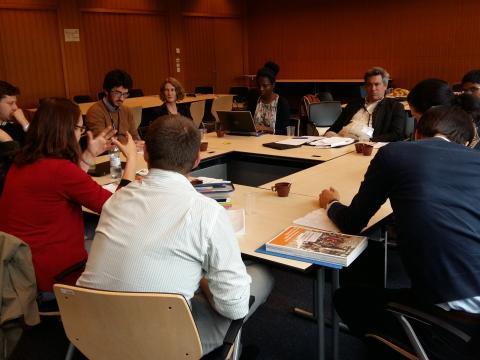World Vision hosts first Urban Thinkers Campus on Healthy and Just Cities

How can cities of the future promote healthy, economically vibrant and inclusive environments for children and youth?
This question drew experts from UN-Habitat, World Health Organisation, International Labour Organisation, Stockholm International Water Institute, Eawag, WasteAID and other leading organisations to World Vision’s Urban Thinkers Campus in Geneva, Switzerland, on October 28.
Themed “Healthy and Just Cities for Children and Youth”, the Campus explored principles, practices and policies that improve access to water, waste and sanitation within informal settlements. Discussions offered possible business models that simultaneously improve the urban environment, reduce public health risks and engage young people in safe and dignified employment within these sectors.
Trapped in fragile pockets of cities across the world, children are most vulnerable to the health and safety risks present in urban slums such as lack of clean environment and safe public space, poor infrastructure, inadequate services, and social, economic and physical exclusion.
Speakers emphasised the growing problem of uncollected solid waste, poor water quality, and unreliable and inadequate facilities for dignified sanitation within informal settlements. While focusing on urban livelihoods, presenters also highlighted how children growing up in families who do not have access to decent work opportunities are often at higher risk of leaving school early and exploited within the informal labour workforce.
Participants engaged with the idea of the ‘3W approach’ (download the concept note) integrating the critical aspects of water, waste and work, to contribute to social, environmental and economic development outcomes. Case studies explored innovative approaches to basic urban service delivery, including informal waste collectives and youth-led waste and community transformation projects in Kenya, skills training of sanitation workers in Ghana, and small business enterprises in waste management services in India.
Constituent groups developed a vision for promoting healthy and just cities for children and youth for consideration into UN-Habitat's The City We Need. They agreed that a healthy city promotes sustainable management of water and waste, ensuring that children and youth have access to clean and safe physical environments. A just city sees children staying in school instead of working in informal labour, whereas youth have access to safe and dignified work.
The Campus promoted the importance of cities to be equitable, inclusive and transparent – where the process of designing and monitoring urban policies and services occurs at all levels of the city. Transparent cities support innovative governance approaches such as participatory budgeting and community contracting, reflecting meaningful multi-stakeholder engagement.
As Co-Chair of the General Assembly Partners’ Children and Youth Constituent Group and lead partner in the World Urban Campaign, World Vision is advocating for the inclusion and meaningful participation of children and youth in shaping our future cities.
Joyati Das, Senior Director of World Vision International’s Urban Programmes stated, “The New Urban Agenda will not succeed if children and youth, who are the present and future, fail to be counted in formal global and local processes. We need children and youth to make us all accountable”.
Download the ![]() Healthy and Just Cities for Children and Youth Report
Healthy and Just Cities for Children and Youth Report
Download the concept note for the '3W Approach', and the full pre-read materials for (1) Waste, (2) Water, (3) Work.
Download the presentations for the following speakers:
- Anika Lenz, UN-Habitat - Liaison Officer
- Jon-Andreas Solberg, UN-Habitat - Youth & Livelihoods Unit - Policy & Strategy Advisor
- Michael Poustie, World Vision International - Urban Technical Specialist (WASH)
- Dr. Marianne Kjellén, SIWI - UNDP Water Governance Facility - Programme Director
- Edmundo Werna, International Labour Organisation - Senior Technical Expert
- Mike Webster, WasteAID UK - Chair
- Régis Garandeau, WSUP Advisory – Urban WASH Specialist
- Kevin Mugenya, World Vision Kenya – Urban Technical Specialist
- Philippe Reymond, Eawag - Department Sanitation, Water and Solid Waste for Development - Environmental Engineer
- Tone Vesterhus - UN-Habitat Youth